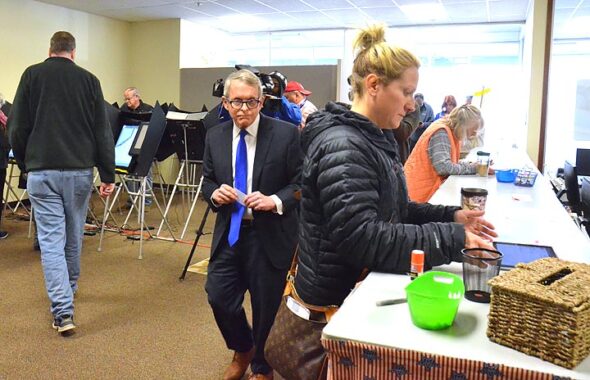
Ohio Gov. Mike DeWine voted early at the Greene County Board of Elections in Xenia on Friday, March 13, before deciding to take steps to cancel the primary election the following Monday. DeWine cited the risk to voters and poll workers from holding the election as usual. DeWine voted here as a resident of Cedarville Township. (Photo by Megan Bachman)
Ohio voting delayed
- Published: March 25, 2020
In a series of rapid developments that took place hours before the Ohio presidential primary, in-person voting in the state was off, then on, then off again.
The turbulence was intense, and left some concerned about whether those who hadn’t voted early or by absentee ballot would be able to vote at all.
“He’s playing a dangerous game here,” Yellow Springs resident Bronwyn Reece observed on Tuesday, having contacted the News to voice her concerns about Gov. Mike DeWine’s move during the previous day’s press briefing to postpone voting in the state due to COVID-19 concerns.
During his March 16 briefing, DeWine recommended that in-person voting, originally scheduled for March 17, be shifted to June 2, and voting by absentee ballot be extended until that time.
Noting that he didn’t have the authority to suspend elections, DeWine told Ohioans that a lawsuit was being filed that afternoon in a Franklin County court arguing for the postponing of elections to protect the health of Ohioans while allowing them to vote by other means or at a later date.
“We should not force them to make this choice,” DeWine said, referencing those who are elderly, medically compromised or otherwise concerned about protecting their health by avoiding polling places.
However, the judge in the case did not deliver the decision Monday night that DeWine and his administration seemed to anticipate. Common Pleas Court Judge Richard Frye denied the effort to shift elections, stating that it would be a “terrible precedent” for a judge to stop voting within 12 hours of the polls opening, according to a Columbus Dispatch report.
Countering that ruling, Ohio Department of Health Director Dr. Amy Acton moved at 10 p.m. Monday to order Ohio polls closed the next day.
“I make this Order to avoid the imminent threat with a high probability of widespread exposure to COVID-19 with a significant risk of substantial harm to a large number of people,” the order reads in part.
“To conduct an election at this time would force poll workers and voters to face an unacceptable risk of contracting COVID-19,” the order continues.
By Ohio law, the state health director has the authority to make “special orders … for preventing the spread of contagious or infectious disease,” the order also notes.
Locally, a statement followed later that night on the website of the Greene County Board of Elections: “Directive 2020-06 was issued to all Board of Elections announcing the Director of Health, Dr. Amy Acton’s order closing all polling locations for the March 17, 2020, election. Once the decision is made of when the Ohio Primary will be held, we will forward the information to you.”
In common with other offices and agencies, the local board of elections then closed Tuesday to the public “to decrease the potential spread of COVID-19.”
Early Tuesday, the Ohio Supreme Court denied a separate legal challenge to the state delaying the primary, effectively permitting the delay to continue.
But it wasn’t clear on Tuesday how voting would proceed.
At his March 17 press briefing, Gov. DeWine noted that specifics on voting were still up in the air, calling it “open for discussion about how it gets worked out.”
He stated that the Legislature and the courts would be involved in determining when and how Ohioans who hadn’t yet exercised their franchise would be able to vote.
Asked why he hadn’t brought the Legislature in the decision earlier, DeWine said “we considered everything,” but stressed the need to move rapidly to respond to an evolving public health crisis.
“Election as it’s normally set could not preserve the safety of the people of Ohio,” he said.
Prior to the March 16 move to shift voting, Secretary of State Frank LaRose had stated that voting would take place as anticipated in Ohio. Three other states went forward with scheduled presidential primaries on Tuesday: Florida, Arizona and Illinois.
Locally, villager Reece said she understood and even appreciated the protection of public health that the move to postpone voting entailed. But she was still nervous about the ambiguous state of Ohioans’ most basic Constitutional guarantee, the right to vote.
“Is there anything legally in place to ensure I can vote?” she asked.
In the coming days, Ohio voters will find out the answer to her question.
The Yellow Springs News encourages respectful discussion of this article.
You must login to post a comment.
Don't have a login? Register for a free YSNews.com account.












No comments yet for this article.